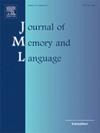Individual differences in the reactivity effect of judgments of learning: Cognitive factors
IF 3
1区 心理学
Q1 LINGUISTICS
引用次数: 0
Abstract
An emerging body of studies has demonstrated that asking participants to make concurrent judgments of learning (JOLs) during learning can reactively change (typically enhance) their memory performance, a phenomenon known as the reactivity effect. The current study conducted the first exploration of individual differences in the JOL reactivity effect by employing a large-scale (N = 284 participants) approach. The reactivity effect was measured in a related word pair learning task, and each of four higher-order cognitive constructs, including working memory capacity (WMC), attentional control (AC), episodic memory (EM), and general fluid intelligence (gF), was assessed by multiple tasks. The results showed that making JOLs enhanced cued recall of related word pairs, reflecting an overall positive reactivity effect. WMC independently and positively predicted JOL reactivity and this prediction effect survived when controlling for the prediction effects of other cognitive constructs. After controlling for the effects of WMC, EM, and gF, AC negatively predicted JOL reactivity. Neither EM nor gF predicted reactivity. These findings lend support to the learning engagement and dual-task costs theories to jointly account for the JOL reactivity effect. Practical implications for guiding learning practices and for mitigating JOL reactivity in future metacognition research are discussed.
学习判断反应效应的个体差异:认知因素
一项新出现的研究表明,要求参与者在学习过程中同时做出学习判断(JOL),可以反应性地改变(通常是增强)他们的记忆表现,这种现象被称为反应性效应。本研究首次采用大规模方法(N = 284 名参与者)探讨了 JOL 反应性效应的个体差异。反应性效应是在相关词对学习任务中测量的,而工作记忆能力(WMC)、注意控制(AC)、外显记忆(EM)和一般流体智力(gF)等四种高阶认知结构则是通过多重任务评估的。结果表明,制作 JOLs 增强了对相关词对的提示性回忆,反映了一种整体的积极反应效应。WMC能独立并积极地预测JOL的反应性,当控制了其他认知建构的预测效应后,这种预测效应依然存在。在控制了 WMC、EM 和 gF 的影响后,AC 对 JOL 反应性的预测为负。EM和gF都不能预测反应性。这些研究结果支持学习参与和双重任务成本理论共同解释 JOL 反应性效应。我们还讨论了在未来的元认知研究中,指导学习实践和减轻JOL反应性的实际意义。
本文章由计算机程序翻译,如有差异,请以英文原文为准。
求助全文
约1分钟内获得全文
求助全文
来源期刊
CiteScore
8.70
自引率
14.00%
发文量
49
审稿时长
12.7 weeks
期刊介绍:
Articles in the Journal of Memory and Language contribute to the formulation of scientific issues and theories in the areas of memory, language comprehension and production, and cognitive processes. Special emphasis is given to research articles that provide new theoretical insights based on a carefully laid empirical foundation. The journal generally favors articles that provide multiple experiments. In addition, significant theoretical papers without new experimental findings may be published.
The Journal of Memory and Language is a valuable tool for cognitive scientists, including psychologists, linguists, and others interested in memory and learning, language, reading, and speech.
Research Areas include:
• Topics that illuminate aspects of memory or language processing
• Linguistics
• Neuropsychology.

 求助内容:
求助内容: 应助结果提醒方式:
应助结果提醒方式:


